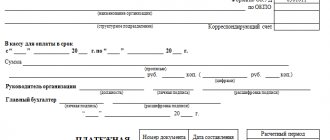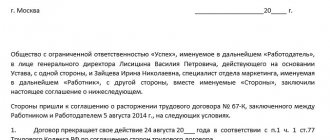Often employees are faced with the problem of delayed wages at an enterprise or organization. Delays in salary payments can be quite long. And today we propose to find out how an employee can receive compensation for delayed wages, and consider the procedure for calculating this payment to an employee.
According to the Constitution of the Russian Federation, all working citizens of Russia have the right to receive full and fair remuneration for their work.
Article 236 (“Financial liability of the employer for delay in payment of wages and other payments due to the employee”) of the Labor Code of the Russian Federation contains a provision on the payment of compensation for wages and other payments that are due to the employee in accordance with current legislation.
It should be noted that the obligation to pay interest on late payments by the employer is established by law not only in relation to delayed wages, but also for other payments, namely:
- severance pay;
- vacation pay;
- social benefits and so on.
The law establishes the employer's obligation to pay wages at least twice a month. Typically, paydays are the 5th–10th and 20th–25th of the month. Moreover, the break between the payment of the advance and the salary cannot be more than 15 days.
Thus, the fact of salary delay is recorded from the next day after the expiration of the payment date established (by the organization’s labor regulations). At the same time, interest begins to accrue.
Rules and features of calculating employee compensation
The basic rule of calculation is the following: for each day of non-payment of wages (or other benefits), an individual entrepreneur or organization is obliged to pay compensation amounts, which are expressed as a percentage (of the amount of debt).
The amount of compensation for delayed payment of wages that the employer must pay is fixed in law. It must be equal to (or higher than) one hundred and fiftieth of the refinancing rate of the Central Bank of the Russian Federation, which is valid for the period of delay.
If the norm is provided for by a collective agreement or local act that is in force in the organization (IP), the amount of compensation payment may be increased. Such documents may be:
- regulations on labor rights;
- regulations on the procedure for payment of wages;
- individual employment contract of the employee.
Please note that the obligation of an organization or individual entrepreneur to pay compensation arises regardless of whether there are signs of guilt in the actions or inactions of the employer that led to the delay in wages.
Note that if the period of time during which the wages were delayed included weekends (holidays), then they are taken into account along with working days.
In addition, if a collective agreement or other act of the organization establishes an amount of compensation greater than that provided by law, then the difference is subject to personal income tax (NDFL).
In a situation where the payday falls on a holiday (or weekend), payment should be made on the last day before the holiday (or weekend) (Part 8 of Article 136 of the Labor Code of the Russian Federation).
Let's give an example: payment of wages at an enterprise is set on the 6th day of the month. The 6th fell on Saturday, which is a day off. Payment of wages on Monday the 8th is considered late, which means that the head of the organization will have an obligation to pay compensation for the delay. Thus, to avoid delays, salaries must be paid on Friday, the 5th.
What is considered a violation of payment deadlines?
The procedure for making payments for wages is enshrined in Art. 136 Labor Code of the Russian Federation. It establishes the following restrictions regarding the timing of salary transfers:
- Payment is made in two installments, 2 times a month;
- Payment must be made no later than 15 days after the end of the accrual period;
- If the payday coincides with a weekend or non-working holiday, then the transfer must be made on the next working day preceding the specified date;
- Vacation pay is paid no later than three days before the start of the vacation.
In addition, in Art. 140 of the Labor Code of the Russian Federation contains a special rule that requires a full settlement to be made upon termination of an employment contract on the day of dismissal.
Violation of any of these provisions will be considered as a fact of non-compliance with labor laws and may subject the employer to various types of liability.
Manager's responsibility for late payments to employees
Current legislation establishes the responsibility of the head of an enterprise (organization, individual entrepreneur) for delays in payment of wages and for refusal to pay compensation for delayed wages to employees.
Articles 134, 195 and 342 of the Labor Code of the Russian Federation provide for disciplinary liability of the employer. In accordance with these articles, the employer, upon application of the trade union organization (another representative body of persons working in the organization), undertakes to take measures provided for by law in relation to the manager who has committed late wages.
Disciplinary measures can include either a reprimand or dismissal. The owner of an organization (enterprise or individual entrepreneur) has the right to independently choose the punishment option. If, as a result of violation of the terms of payment of wages, the payment of compensation caused material damage to the organization, then the employer can sue to compensate for the damage by recovering from the violating manager. The court may decide to impose a penalty on the perpetrator if the offender’s guilt is proven.
In addition to disciplinary liability, administrative liability is also provided. According to Article 27 of the Code of Administrative Offenses, the head of an organization, in case of delay in salary and refusal of compensation, faces an administrative fine. It should be noted that the amount of the fine is considerable - from 30 to 50 thousand rubles.
Types of responsibilities of an entrepreneur
An individual entrepreneur for late payment of earnings to an employee in 2020 will certainly suffer punishment for this, which is expressed in the degree of responsibility of the employer, including the management company. What types of liability may occur in this case? There are several types:
- Administrative;
- Material;
- Criminal (there are legal methods of influencing violators).
In order for criminal liability to arise under the Criminal Code of the Russian Federation, the employer must ignore all previous warnings and other measures. This is a rather rare degree of responsibility, but it is worth taking it into account, especially when choosing the option - to pay or not to pay wages on time. The Criminal Code is used as a last resort for those employers who do not change their rules and work methods.
The first and easiest level of responsibility is disciplinary responsibility. However, the worst thing for someone responsible for paying salaries can be dismissal from their position. Such cases are not uncommon in an enterprise, where the team can get together and take appropriate measures in an organized manner to ensure that this does not happen again. The Criminal Code is not mentioned at all now.
Financial liability may have a fairly wide scope. In addition to paying compensation, the person who is responsible for the reasons for late payment may also pay the amount of the company's losses. This option is possible if, in the event of payment of compensation, the organization was forced to incur losses. The head of the enterprise has the right to apply to the court and, if there are sufficient grounds for this, the court can make a positive decision. The Criminal Code protects both the employee and the employer. The evidence base must be sufficient.
Administrative liability occurs when the employer refuses to pay compensation to employees. This fact is regulated by Article 5.27 of the Administrative Code. As for the amount of the fine imposed, it ranges from 30 thousand Russian rubles to 50 thousand. It is also worth noting that in case of further non-compliance with the law, that is, violation of the labor code, more stringent measures may be taken - dismissal with a restriction, according to which it is strictly prohibited to hold leadership positions during those years. The Criminal Code is applied last.
Actions of employees in case of delayed wages
If wages are delayed for a long time, the employee has the legal right to contact the labor inspectorate to receive the payment due to him.
The first thing an employee should do to protect his interests is to contact the labor inspectorate located at the location of the legal address of the employing organization. The inspectorate has the right to order an inspection and issue an order, according to which the employer is obliged to immediately pay the employee wages, including compensation for their delay.
The most effective measure is that the law allows an employee to stop working from the 15th day of non-payment of wages until the wages are paid. The administration should be notified about this in writing and make sure that a mark indicating the receipt of the warning is received (on the delivery receipt or on a copy of the application), otherwise the employer may refuse to receive the notification. In such a situation, the employee’s refusal to work will be regarded as absenteeism, entailing disciplinary action, which may even be dismissal.
It is also important to remember that it is impossible to refuse to work for civil servants and employees of organizations that are engaged in issues of life support for the population. This category includes: ambulance workers, energy workers and communications workers.
When should an employee take action?
If the employer violates the Labor Code of the Russian Federation and other laws, the employee must know and understand how to protect himself. He must do this himself, since no one may even know this. Thus, if wages are delayed, the employee must contact the labor inspectorate. When should this be done, and is it even worth doing? Many people believe that this is an extreme measure, because they do not want to spoil relations with their superiors. But this is a mistaken opinion, because management also needs checks and stimulation of work. If you contact the appropriate organization once, then probably your salary will not be delayed the second time.
Calculation of compensation for delayed wages: formula and examples
In order to calculate compensation for delayed wages in 2020, you must use the following formula:
K = ZP x D x (1/150) x SR, where: K - compensation for delay of salary to the employee; ZP - amount of wage arrears; D - total delay period; SR - refinancing rate (in the calculation the value is used not in %, but in fractions of a unit).
Please note that compensation for late payment of wages is calculated not from the amount of accrued wages, but from the amount to be paid, that is, after withholding personal income tax.
Example of compensation calculation
Local regulations of the organization establish the following terms for payment of wages:
- advance payment - on the 20th of the current month;
- salary - 4th day of the month following the billing month.
Let’s assume that the advance payment to an employee (with a salary of 15 thousand rubles) was paid on time in the amount of 5 thousand rubles. The organization paid the employee’s salary in the amount of 10 thousand rubles (after personal income tax withholding) not on the 4th, but on the 22nd of the following month. The delay period was 18 days. Since compensation is paid for each day of delay, as indicated in Art. 236 of the Labor Code of the Russian Federation, therefore, both working days and weekends are taken for calculation. The counting of days of delay begins from the next day after the scheduled payment date until the day of actual payment, inclusive.
K = 10,000×18×1/150×0.0825 = 99.00 (rubles).
Thus, compensation for delayed wages to an employee is 99 rubles, 0 kopecks. That is, the salary on the day of payment should be:
10,000 + 99.00 = 10,099.00 (rubles).
Refusal to continue working
If an unscrupulous employer has not provided repayment of debts to staff within 15 days or more, workers have the right to refuse to perform official functions. However, such an event requires compliance with a number of requirements. A prerequisite is an official notification to management and receipt of confirmation of such information. The message is made in writing. The strike may continue until the debt is paid in full.
The organization notifies employees in writing of its readiness to pay off the debt. In this case, the work process is resumed no later than the next day. During the entire period of suspension of work, the employee retains his average earnings.
Last changes
Since October 2020, Federal Law No. 272-FZ of July 3, 2020 came into force, which is aimed at encouraging employers to pay employees wages on time.
The above Law provides, among other things, for the timing of salary payments in 2020 and some other changes. Namely:
- employers must pay wages no later than 15 calendar days from the end of the period for which they were accrued;
- Employees have the right to declare their violated rights in court within a year. This period is calculated from the date of payment of the specified amounts. Previously this period was 3 months;
- an employee may file a claim for restoration of labor rights at his place of residence;
- labor inspectorates have the right, without agreement with the prosecutor's office, to conduct unscheduled inspections of enterprises based on complaints from workers about non-payment of wages;
- the amount of monetary compensation for delayed salaries will be 1/150 of the key rate of the Central Bank of the Russian Federation, instead of 1/300.
- warnings will not be applied to officials who have delayed payment of wages. The fine in case of a one-time delay in payment of wages will range from 10,000 to 20,000 rubles. If wages are not paid again, the fines will be: for individual entrepreneurs from 10,000 to 30,000 rubles; for legal entities from 50,000 to 70,000 rubles; officials who delay the payment of wages more than once are deprived of their positions for a period of one to three years.
Material liability
This responsibility is imposed on the manager for the delay in paying wages to employees. Employees have every right to demand payment from the employer, as well as receive interest for late payment and compensation for moral damage incurred. In this case, the fact for what reason there was a failure in the issuance of pay does not play any role. Find out more about workers' rights when wages are delayed here.
The employer has 15 calendar days left to pay wages from the end of the accrual period (Article 136 of the Labor Code of the Russian Federation). The exact date of payment is determined by the internal regulations of the institution and is supported by the relevant agreement.
Compensation
Additional
means of compensation for delayed payment of wages:
- are not subject to personal income tax;
- are not included in income tax expenses;
- are subject to insurance premiums for compulsory insurance in the same way as wages.
Since October 2020, the procedure for calculating compensation for non-payment of wages to employees has changed. Interest is accrued in accordance with the key rate of 1/150 (Article 2 No. 272-FZ of July 3, 2016). For example, a fixed salary payment date in a company is the 10th day of each month. The employee’s payment for January (50,000 rubles) was made on 02/20/2017. For 10 days (from 02/10/2017 to 02/20/2017 inclusive), taking into account the rate of the Central Bank of the Russian Federation (10%), compensation in the amount of 333 rubles was accrued.
Previously, this rate was 1/300. Thus, the minimum amount for compensation has been doubled by the Law. At the request of the employer, the amount of compensation can be increased and must be specified in the employment agreement or local regulations (Article 236 of the Labor Code of the Russian Federation).
Payment for late wages is the direct responsibility of the employer: the employee does not need to submit any documents or complain to higher management. Compensation is paid at the same time as the delayed salary amount.
Suspension of official duties
An employee may not come to the workplace until the day of payment of wages if the delay in payment of wages exceeds 15 days (Article 142 of the Labor Code of the Russian Federation). You should inform management of your desire in writing.
When management begins making payments, that employee is notified by notice in writing. After receiving it, he must go to his workplace. If he did not do this, this act is regarded as truancy.
All days during the period of suspended work must be paid in the amount of the average wage (document No. 14-2-337 of the Ministry of Labor of Russia dated December 25, 2013). Read about payment for forced downtime due to the employer's fault here.
It is worth noting: there are some nuances in the issue of suspension of labor activity. Such self-defense actions are legal only in case of delay in payment of wages. If the employee was not paid vacation pay, and he decided not to go to work after the vacation until it was paid, then this will qualify as absenteeism. To defend the payment of vacation pay on time, there is another mechanism of influence.
Some categories of employees cannot stop performing their job duties (Part 2 of Article 142 of the Labor Code of the Russian Federation):
- military and civil servants;
- people who support people’s livelihoods (electricians, doctors, etc.) or who work in particularly hazardous industries and equipment;
- when a state of emergency is declared.
Insurance premiums for payment of compensation for delayed wages
The issue of calculating insurance premiums from the amount of compensation for delayed wages under the legislation of the Russian Federation is in a controversial situation. There is no clear solution in any legislative act. The Ministry of Finance, in its letters dated September 24, 2018 No. 03-15-06/68161 and dated September 24, 2018 No. 03-15-05/68049, clearly states that insurance premiums from compensation for delayed wages must be calculated in the same way as from wages . However, the Supreme Court (ruling No. 303-KG18-4287 dated 05/07/2018) does not agree with the Ministry of Finance and believes that compensation for delayed wages is not subject to contributions.
Therefore, if you do not want to enter into legal proceedings with the Federal Tax Service and the Social Insurance Fund, then mandatory insurance contributions from the amounts of compensation for delayed wages must be calculated and transferred to the budget.
Responsibility for late payment of wages
An employer who fails to pay wages on time is subject to administrative liability. A fine may be imposed on him, as well as on the enterprise. If wages are delayed for more than two months or several times in a row, criminal liability arises, which threatens not only large fines, but also deprivation of the right to hold specific positions, carry out certain activities, as well as imprisonment for up to two years.
Was the information interesting or useful?
Yes35
No2
Share online







